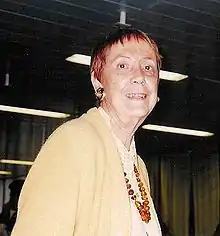Angélica Gorodischer
Angélica Gorodischer (born 28 July 1928)[1] is an Argentine writer known for her short stories, which belong to a wide variety of genres, including science-fiction, fantasy, crime and stories with a feminist perspective.[2][3]

Biography
Born in Buenos Aires, Gorodischer has lived in Rosario since she was eight, and this city appears very frequently in her work. In 2007 the city council of Rosario awarded her the title of Illustrious Citizen.[4]
In the English-speaking world Gorodischer might be best known for Kalpa Imperial (In Argentina volume 1 appeared in 1983 and both volumes by 1984). Its English translation came in 2003 by United States speculative fiction author Ursula K. Le Guin. A collection of short stories, it details the history of a vast imaginary empire through tales of fantasy, fable, and allegory. It does this in a way that gained in many admirers who deem it to be one of the finest genre work of Argentina. It also gained supporters in the English-speaking world. A part of the work appeared as a story in the American anthology Starlight 2. [5]
She also produced many works before Kalpa Imperial including the collections Opus dos [Opus two, 1967], Bajo las jubeas en flor [Under the Flowering Jubeas, 1973], and Casta Luna Electronica [Chaste Electric Moon, 1977]. She was a science fiction author noted for her work about the differences of power among men and women. She focused on the pros and cons of people in power and wrote about corrupt rulers.
Gorodischer is author of two novels within the genre of detective fiction. Her detective persona is a female grand dame who reluctantly and haphazardly engages in the world of international intrigue. She made her literary debut in 1985 in Gorodischer's short fictional tale or noveleta entitled Floreros de alabastro, alfombras de Bokhara, reappearing later in different form in Jugo de mango (1988).[6]
Works
- Cuentos con soldados (Premio Club del Orden, Santa Fe, 1965. stories)
- Opus Dos (Ediciones Minotauro, Buenos Aires, 1967. novel)
- Las pelucas (Editorial Sudamericana, Buenos Aires, 1968. stories)
- Bajo las jubeas en flor (Ediciones De La Flor, Buenos Aires, 1973. stories)
- Casta luna electrónica (Ediciones Andrómeda, 1977. stories)
- Trafalgar (El Cid Editor, Buenos Aires, 1979. stories)
- Kalpa imperial (Ediciones Minotauro, Buenos Aires, 1983. stories)
- Mala noche y parir hembra (Ediciones La Campana, Buenos Aires, 1983. stories)
- Floreros de alabastro, alfombras de Bokhara (Vases of Alabaster, Carpets from Bokhara). Lyndhurst, NJ: Lectorum Publications, 1985. (novel)
- Jugo de mango Emecé Editores, Buenos Aires, 1988. Novela.
- Las Repúblicas Ediciones de la Flor, Buenos Aires, 1991. Relatos.
- Fábula de la virgen y el bombero. Buenos Aires: Editiones de la Flor, 1993. (novel)
- Mujeres de palabra. Editor. San Juan: University of Puerto Rico Press, 1994.
- Prodigios. Barcelona: Ed. Lumen, 1994. (novel)
- Tecnicas de supervivencia. Rosario: Ed. Municipal Rosario, 1994. (stories)
- La noche del innocente. Buenos Aires: Emecé, 1996. (novel)
- Cómo triunfar en la vida. Buenos Aires, Emecé, 1998. (stories)
- "The End of a Dynasty." Chapter from Kalpa Imperial. Translated by Ursula K. Le Guin. In Starlight 2. Edited by Patrick Nielsen Hayden. New York: Tor, 1999.
- Gorodischer, Angélica (2000). Menta (1. ed.). Buenos Aires Argentina: Emecé Editores. ISBN 978-950-04-2187-4.
- Gorodischer, Angélica (2007). A la tarde, cuando llueve (1. ed.). Buenos Aires: Emecé. ISBN 978-950-04-2913-9.
- Gorodischer, Angélica (2008). Tres colores (1a ed.). Buenos Aires: Emecé. ISBN 978-950-04-3022-7.
- Gorodischer, Angélica (2009). La cámara oscura (1a ed.). Buenos Aires Argentina: Emecé Editores. ISBN 978-950-04-3184-2.
English Translation
- Kalpa Imperial: The Greatest Empire That Never Was. Translated by Ursula K. Le Guin. Northampton: Small Beer Press, 2003. ISBN 1-931520-05-4
- Trafalgar. Translated by Amalia Gladhart. Small Beer Press, 2013 [7]
- Prodigies. Translated by Sue Burke. Small Beer Press, August 2015. ISBN 978-1-6187-3099-2 [8]
References
- "angelica gorodischer - versión en español". Archived from the original on 2009-10-26.
- Biography
- Biography Archived December 22, 2005, at the Wayback Machine (Spanish)
- "Ilustre Gorodischer". 2007-05-25. Retrieved 2011-02-06.
- "Stories Among the Ruins: Angelica Gorodischer's Kalpa Imperial" Archived 2007-04-26 at the Wayback Machine by John Garrison, January 19, 2004, Strange Horizons
- Garcia Chichester, Ana. "Representing the Female Sleuth: Logic and Femininity in Angélica Gorodischer's Floreros de alabastro, alfombras de Bokhara." In Identity, Nation and Discourse: Latin American Women Writers and Artists. Ed. Claire Taylor. London: Cambridge Scholars Publishing, 2009.
- Upcoming4.me. "Angelica Gorodischer's Tragalgar cover art, synopsis and release date". Upcoming4.me. Archived from the original on 20 July 2012. Retrieved 18 July 2012.
- Small Beer Press website: http://smallbeerpress.com/forthcoming/2014/10/23/prodigies/